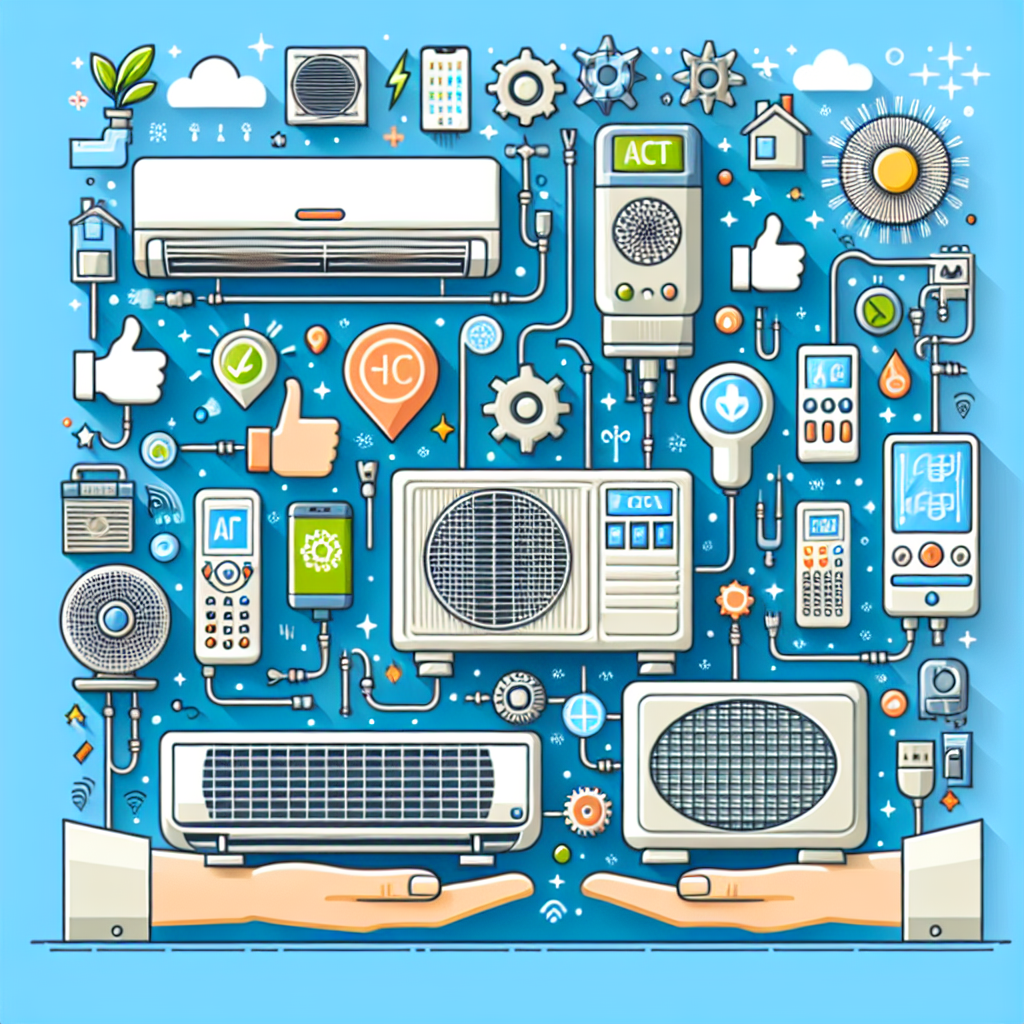As temperatures rise and the summer heat intensifies, many homeowners and businesses seek relief through air conditioning. However, choosing the right air conditioning system is not a one-size-fits-all decision. Understanding the pros and cons of different air conditioning systems is essential for making an informed choice that best fits your needs. In this article, we’ll explore the various types of air conditioning systems, their benefits and drawbacks, and some tips to help you make the best decision for your comfort.
Types of Air Conditioning Systems
Before diving into the pros and cons, let’s briefly overview the most common types of air conditioning systems:
- Central Air Conditioning
- Window Units
- Split Systems
- Portable Air Conditioners
- Ductless Mini-Split Systems
- Evaporative Coolers
Central Air Conditioning: Whole House Comfort
Pros
- Efficiency: Central air conditioning systems are typically more efficient than window units, cooling entire homes evenly.
- Convenience: Once installed, these systems require minimal maintenance and provide consistent comfort throughout your home.
- Quiet Operation: Compared to window units, central systems operate quietly, as the noisy parts are positioned outside.
Cons
- High Installation Cost: The initial investment for a central air system can be significantly higher due to installation and ductwork.
- Space Requirements: These systems require a considerable amount of space, both inside for the air handler and outside for the condenser.
- Duct Maintenance: Without proper maintenance, ducts can accumulate dust and allergens, diminishing air quality.
Window Units: Affordable and Accessible
Pros
- Cost-Effective: Window units are one of the most affordable options for cooling single rooms or small apartments.
- Easy Installation: They typically require no professional installation and are quick to set up for those with basic DIY skills.
- Energy Efficiency: When cooling a single room, window units can be more energy-efficient than central air.
Cons
- Limited Cooling Capacity: These units are less effective for larger spaces, potentially leading to distorted temperatures in larger homes.
- Noise Levels: Window units can be noisy, disrupting the peace of your home.
- Obstructed Views: Installing a window unit can block natural light and reduce your view.
Split Systems: Flexible Cooling Solutions
Pros
- Tailored Comfort: Split systems can cool multiple rooms at different temperatures, providing personalized comfort.
- Energy Efficiency: These systems tend to be more energy-efficient compared to central systems, particularly if you only need to cool specific areas.
- Quiet Operation: The indoor units operate quietly as the compressor is located outside.
Cons
- Installation Complexity: Professional installation is often required, adding to overall costs.
- Aesthetic Concerns: Indoor units can be less visually appealing and may not fit integrated designs.
- Higher Initial Costs: While they offer flexibility, the initial investment can be higher than window units.
Portable Air Conditioners: Ultimate Mobility
Pros
- Versatility: Portable air conditioners can be moved from room to room, providing cooling exactly where you need it.
- No Permanent Installation: As they do not require permanent installation, they are a great option for renters.
- Lower Upfront Costs: They usually come at a lower price point compared to central systems.
Cons
- Limited Cooling Power: Portable units may not cool large spaces effectively, especially on very hot days.
- Drainage Requirement: Many units require regular drainage, which can be inconvenient.
- Noise Levels: They can also be noisy, impacting comfort levels in shared spaces.
Ductless Mini-Split Systems: Efficient and Sleek
Pros
- Energy Efficient: Mini-splits boast impressive energy efficiency and can lead to substantial savings on utility bills.
- Zoned Cooling: Like split systems, they allow for zoning, enabling different temperatures in different areas.
- No Duct Work: Ductless systems avoid the energy losses often seen in ducted systems.
Cons
- Higher Initial Costs: The upfront costs for mini-split installations can be significant.
- Aesthetic Considerations: The indoor units may not blend seamlessly with home decor.
- Professional Installation Required: Proper installation is essential for optimal performance, necessitating a professional.
Evaporative Coolers: Eco-Friendly Alternatives
Pros
- Energy Efficient: Evaporative coolers consume significantly less electricity than traditional systems, making them eco-friendly options.
- Cost-Effective: Their initial costs and operating expenses are generally lower than traditional AC units.
- Improved Air Quality: They increase humidity levels in dry climates, enhancing overall air quality.
Cons
- Climate Dependent: Evaporative coolers work best in dry, arid regions; they may be ineffective in humid climates.
- Limited Cooling Capacity: They only cool the air and do not dehumidify it, making them less effective in high-humidity areas.
- Regular Maintenance: These systems require consistent upkeep to keep water levels and pads clean.
Making an Informed Choice
Choosing the right air conditioning system depends on several factors, including budget, space availability, energy efficiency, and personal comfort preferences. Here are some tips to guide your decision:
- Assess Your Space: Consider the size of your area and whether you need to cool multiple rooms or just one.
- Evaluate Your Budget: Factor in installation costs versus long-term energy savings to determine the best fit for your finances.
- Consider Your Climate: The efficiency of a system can be greatly affected by your geographic location and climate.
- Think About Maintenance: Some systems require more maintenance; choose what you’re prepared to manage.
- Consult a Professional: When in doubt, an HVAC specialist can help you determine the best system for your specific needs.
Conclusion
Choosing the right air conditioning system can significantly impact your comfort and energy bills. By weighing the pros and cons of each option, you can make a more informed decision that aligns with your lifestyle and needs. Remember, a well-chosen cooling system can make all the difference in achieving the comfort you desire during those hot summer months. Stay cool!


